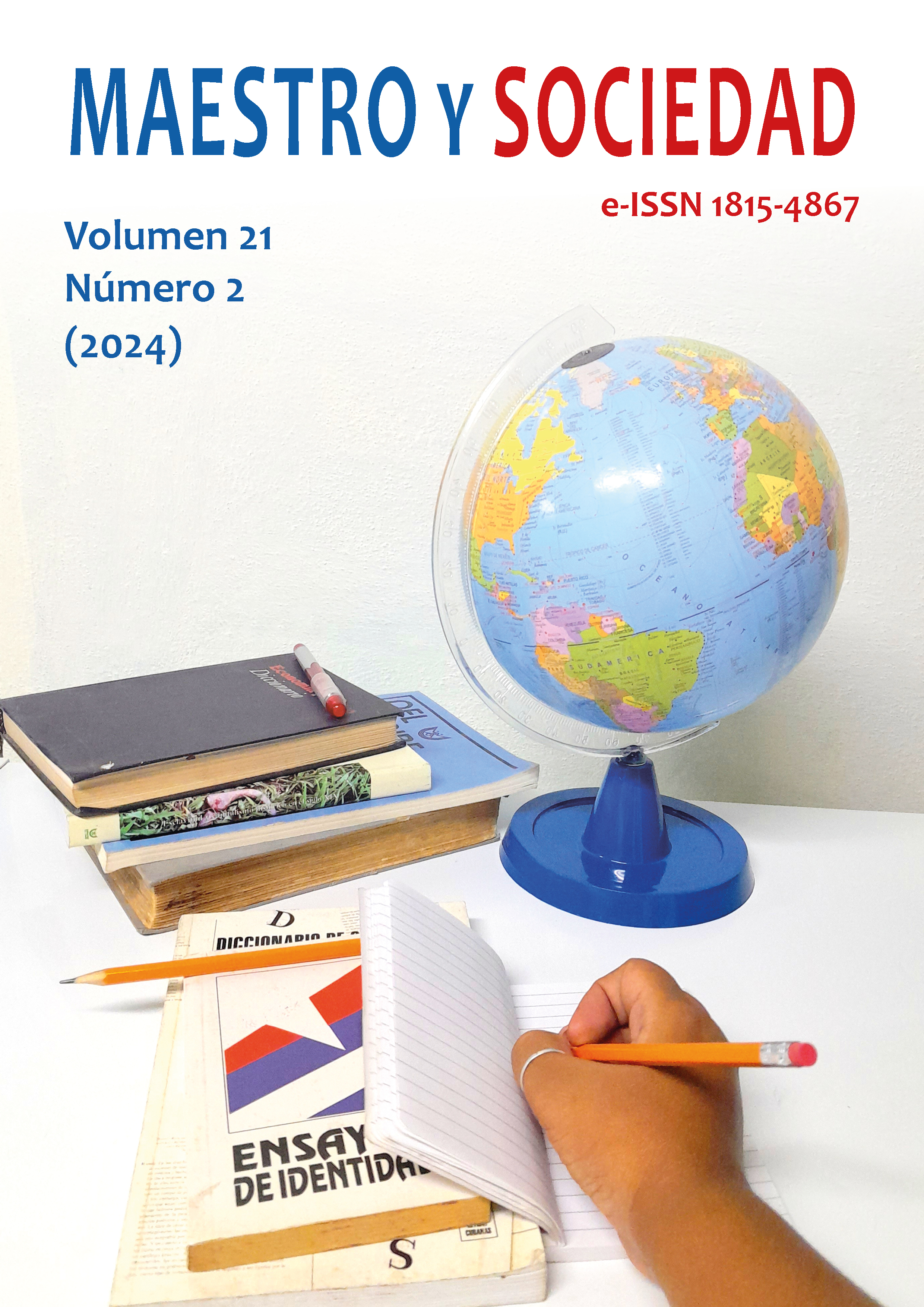The active participation of the family and the community in the pedagogical process of the “Rosa Dominga Yuma” school
Keywords:
active participation, family - community, pedagogical processAbstract
Introduction: The objective of this research is to design a multifactorial and contextualized pedagogical strategy that promotes the active participation of the family and the community in the pedagogical process of the “Rosa Dominga Yuma” school. Materials and methods: A methodological route is followed that consists of three phases; causal diagnosis of the problem, structuring of the pedagogical proposal and assessment of the effectiveness and relevance of the strategy in the pedagogical process. Among the main theoretical methods used are analysis-synthesis, hermeneutics and structural systemic; while the empirical ones were the observation, the interview, the survey and the assessment scale, which contributed to endorsing the progress achieved in terms of the active participation of the family and the community in the pedagogical process of the School of Basic Education. Results: Part of the results means the achievement of better levels of integration between the educational factors of the different contexts of professional performance, as well as the leading role of the school in said relationship. Discussion: The pedagogical strategy is a valuable tool for the actors of the pedagogical process that favors the active participation of the educational agents of the family and the community. Conclusions: The active participation of the family and the community in the pedagogical process is a current topic that suggests considering the multifactorial and the contextualized as distinctive features of the process.
References
Altarejos, M. F. y Nava, D. C. (2000). Filosofía de laeducación. Universidad de Navarra, EUNSA. Ediciones Universidad de Navarra, S.A.
Cantos Figueroa, M. de L., Bernal Álava, Á. F., Lucas Vidal, M. y Vélezde la Cruz, M. (2022). Participación activa en eventos científicos y el aporte de las herramientas tecnológicas. Dom. Cien., ISSN: 2477-8818. Vol. 8, núm. 3. Julio-Septiembre, 2022. 1274-1290.
Casal, J., Feito. R., Fernández, F., Flecha, R. García, C., García, M. Granados, A., Guerrero, A., Masjuan, J., Merino, R., Oliver, E., Planas, J., Puigvert, L., Rotger, J., Sala, G., Serradel, O. y Troiano, H. (2003). Sociología de la Educación. https://sociologiaeducativa.files. wo rdpress.com/2018/02/sociologia-de-la-educacion.pdf
Epstein, J. L. (2009). School, family and community partnerships: caring for the children we share. En J. L. Epstein (Ed.), School, family, and community partnerships, your handbook for action (pp.9-39).https://www.scielo.cl/scielo.php?
Epstein, J. L. (2013). Programas efectivos de involucramiento familiar en las escuelas: estudios y prácticas. Hueders Ltda. https://www.fundacioncap.cl/wp-content/uploads/2015/09/Programas_efectivos_de_involucramiento_familiar_en_las_escuelas-Joyce_Epstein.pdf
García, G. (2002). “Compendio de Pedagogía”. Editorial Pueblo y Educación.
Henderson, A. y Berla, N. (1994). Α Nueva Generación de Evidencia. La familia es fundamental para el rendimiento estudiantil. Comité Nacional para Ciudadanos en la Educación. https://files.eric.ed.gov/fulltext/ED375968.pdf
Sampieri, R., y Mendoza, C. (2018). Metodología de la Investigación: de laInvestigaciónlasRutas. PDF
Letort, D. (2016). La formación integral de los estudiantes. Colloquia: Revista de pensamiento y cultura, ISSN-e 1390-8731, Nº. 3, 2016 (Ejemplar dedicado a: Colloquia, Volume 3). 133-143
Martínez, R. E.(2007).Sistema de actividades para perfeccionar la relación escuela-familia-comunidad en la Secundaria Básica “Fe del Valle Ramos”. Tesis en opción al título académico de Licenciado en Educación. Santiago de Cuba: UCP Frank País.
Meza, J. y Páez, R. (2016). Familia, Escuela y Desarrollo Humano Rutas de investigación educativa. CLACSO. http://biblioteca.clacso.edu.ar/clacso/gt/20161116033448/FamiliaEscuelaYDesarrolloHumano.pdf-
Ministerio de Inclusión Social del Ecuador. (2018). Mejorando nuestra convivencia en la familia. https://biblio.flacsoandes.edu.ec/libros/digital/58127.pdf
Ministerio de Educación (2023). Reglamento General aLa Ley Orgánica deEducación Intercultural. https://www.educacionbilingue.gob.ec/
Ministerio de Educación (2023). Ley Orgánica de Educación Intercultural (LOEI). https://educacion.gob.ec/ley-organica-de-educacion-intercultural-loei/
Padilla García, O., Cancio Lorenzo, E., & del Pino Calderón, J. L. (2020). Estrategia con enfoque multifactorial para la orientación profesional pedagógica. REFCalE: Revista Electrónica Formación Y Calidad Educativa. ISSN 1390-9010, 7(3), 45–59. Recuperado a partir de https://refcale.uleam.edu.ec/index.php/refcale/article/view/2566
Sanz, G., Prados, H., Martínez, P., y Vicente, G. (2016). Participación familiar en la etapa de educación primaria. Perfiles Educativos. Perfiles Educativos, XXXVIII(154), 97-117. https://doi.org/http://www.redalyc.org/articulo.oa?id=13248313006
Pérez, A. (1997). Introducción a la sociología de la educación. https://www.academia.edu/39150941/
Pulla, O., López, M., Orellana, S., Irma, J. y Armijos, L. (2019). La relación de la escuela con los padres de familia en una provincia con altos índices de pobreza y altos resultados escolares en Ecuador. Revista Espacios. https://www.revistaespacios.com/a19v40n36/a19v40n36p11.pdf
Simón, C., G., & Echeita, Gerardo. (2016). Escuela, Familia y Comunidad: Construyendo Alianzas para Promover la Inclusión. Revista latinoamericana de educación inclusiva, 10(1), 25-42. https://dx.doi.org/10.4067/S0718-73782016000100003
Vygotsky, L. S. y Cole, M. (1984). La mente en la sociedad: desarrollo de procesos psicológicos superiores. Prensa de la universidad de Harvard.
Published
How to Cite
Issue
Section
License
Copyright (c) 2024 Gilma Josefina Bosquez Morejón, Rosa Hortencia Pilligua Cedeño, Katia Lisset Fernández Rodríguez, Wilber Ortiz Aguilar

This work is licensed under a Creative Commons Attribution-NonCommercial-NoDerivatives 4.0 International License.
This journal provides immediate open access to its content, based on the principle that offering the public free access to research helps a greater global exchange of knowledge. Each author is responsible for the content of each of their articles.



























 Universidad de Oriente
Universidad de Oriente 